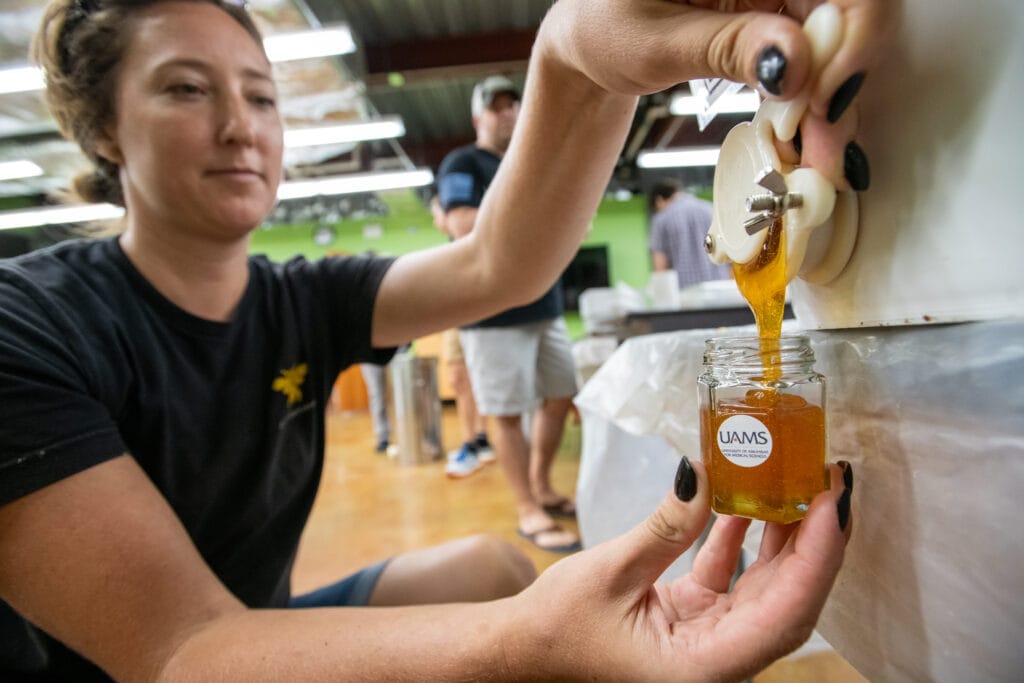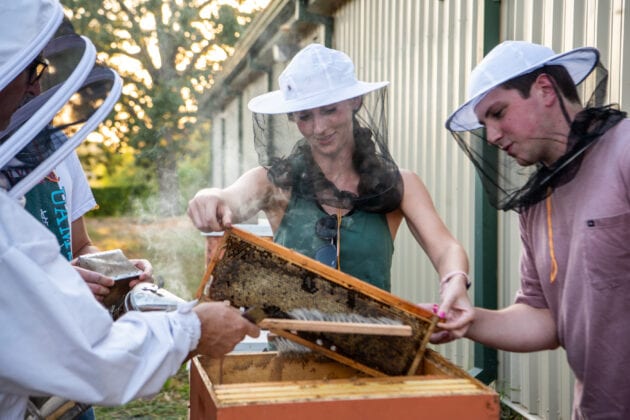
On the south edge of the University of Arkansas for Medical Sciences (UAMS) Little Rock campus, a community is thriving with the help of College of Medicine faculty and medical students.
A community of honeybees.
UAMS is home to two healthy hives through a “host-a-hive” partnership with a local apiary initiative that benefits both bees and people. The hives give the local bee population a boost, and educational activities raise awareness in the human community about the crucial work of bees.
The project was initiated by Andrew Morris, Ph.D., a professor in the Department of Pharmacology and Toxicology who holds the Mehta/Stebbins Chair in Cardiovascular Research and is a Research Career Scientist at the Central Arkansas Veterans Affairs Healthcare System (CAVHS). Morris connected UAMS with the local beekeeping community and Calm+Confidence founder and apiary manager Lauren Anderson. Medical students in the College of Medicine’s Tank Academic House were the first to get involved with the beekeeping endeavor as a community service project.
“Honeybees are critical pollinators to support reproduction of plants and trees as well as commercial crops, but this has been impacted by declines in bee populations,” Morris said. “Hosting hives at UAMS, where we have large areas of land, is something we can do to help.”
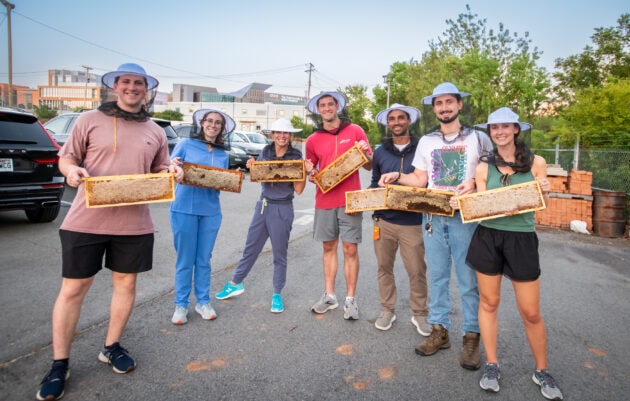
“Beekeeping is fascinating,” he said. “And learning to handle bees is good practice for remaining calm under stressful situations, which is certainly something medical students can benefit from.”
On a warm September evening, six students and Lindsey Sward, M.D., a Tank House faculty advisor, assistant dean for clinical education and associate professor of obstetrics and gynecology, joined Morris at the UAMS hives to inspect the bees and prepare for the first harvest of honey under Anderson’s guidance. Wearing protective veils, participants used a device called a smoker to harmlessly subdue the bees – as many as 50,000 in a hive – before opening the stacked hive boxes. Then they lifted rectangular frames from the boxes, revealing honeycomb laden with honey.
“It was a lot different than I expected,” said fourth-year medical student and Tank House Leadership Committee member Blaire Taggart. “I didn’t expect the bees to be so docile.”

The following Saturday, several Tank House students and Morris joined Anderson for a “Honey Harvest” educational event at the Hillary Rodham Clinton Children’s Library & Learning Center, located on 10th Street south of campus. The air was thick with the sweet, floral scent of honey as excited children and their parents, along with other library and beekeeping community volunteers, helped extract honey from frames. Visitors learned about bees and honey production and compared the taste of honey from UAMS and the nearby Hillcrest neighborhood.
Morris was stationed at one of two cylindrical stainless steel “spinners” that extract honey from frames, leaving the honeycomb intact so it can be returned to the hive. Two frames holding honeycomb are placed inside the container, the lid is clasped shut, and a crank is turned to release the honey through centrifugal force.
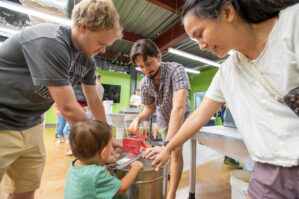
“See how this works?” Morris asked as he encouraged 8-year-old Charlotte Sims and her 5-year-old brother, Aiden, to take turns spinning the crank as fast as they could. Morris opened the lid and lifted one of the frames of honeycomb, still heavy with honey.
“Whoa!” the siblings exclaimed in unison.
“This is yummy business,” declared Charlotte, licking fingers that had become sticky in the process.
College of Medicine senior Justin Stanley, who chairs the Tank House Community Service Committee, organized students for the hive inspection and the event at the library. During a pause from working with children, he explained how the COVID-19 pandemic had limited the ability to do in-person community outreach.
“During the pandemic, everything went virtual, so it was really hard to have events like this,” Stanley said. “Now that we’re on the other side of the pandemic, we are trying to do more community service activities. We knew this would be a great way to start the academic year. It is nice to work with the kids, and honeybees are so vital to our ecosystem and health in general.”
Karina Clemmons, Ed.D., a Tank House advisor, assistant dean for medical education and associate professor in the Department of Medical Humanities and Bioethics, brought her 10-year-old son Julian to the library event. Weeks earlier, she had heard about the new UAMS project from Morris and helped Tank House student leaders connect and become involved.
“This is such a wonderful service project for UAMS and our students,” Clemmons said. “It supports people who live in this area directly by generating more bees to pollinate gardens. And Tank House students are serving as community educators, helping kids and families understand the importance of supporting a healthy bee community literally in their backyards.”
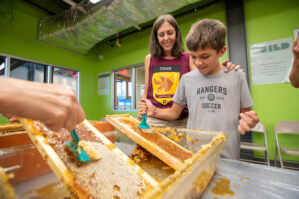
Long interested in beekeeping, Morris tapped into the Little Rock beekeeping community about a year and a half ago and hosts a hive at his house in Hillcrest. He said Anderson’s expertise has been indispensable in maintaining a healthy hive. Morris is also working with CAVHS to place hives at the Eugene J. Towbin VA Healthcare Center in North Little Rock.
The world of bees also meshes with Morris’ interests as a scientist. “Despite how important bees are, there is a huge amount about them that we don’t understand,” he said. “I have been tempted to do bee-related research.”
The two worlds are not without parallels. Some of Morris’ research has centered on how lipids – fats – affect heart disease. Bees don’t hibernate, he noted. They change their metabolism to store fat while wintering in the hive. Finding ways to switch fat storage on and off could have important implications for human health.
At the end of the library event, Anderson weighed UAMS’ first harvest – 25 pounds of honey, which filled a five-gallon bucket. Through the partnership, half of the sweet harvest will go to UAMS.
Meanwhile, the bees will have another month or so to supplement the honey that was left in their hives, so they will have plenty to live on as they spend the winter keeping warm in their hive and get ready to start work again in the spring.
